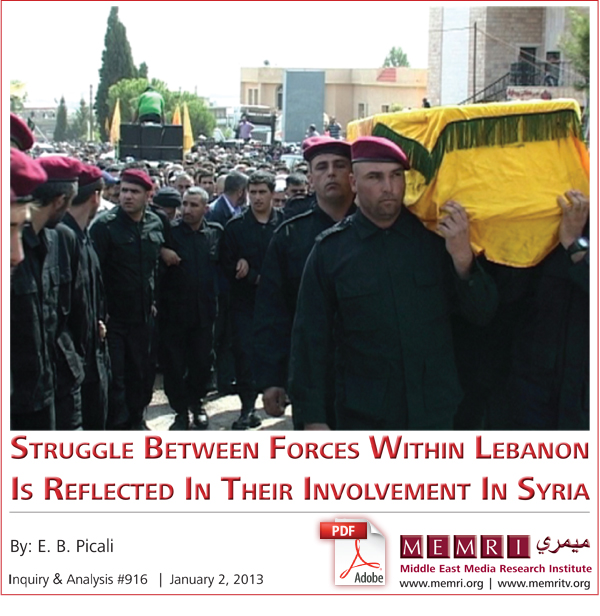|
Introduction
The rivalry between Hizbullah and the Al-Mustaqbal faction in Lebanon is reflected, inter alia, in their differing stances on Syria: While Hizbullah supports the Assad regime, Al-Mustaqbal wants to see it toppled. Moreover, numerous reports in the Arab and Western media indicate that both groups are involved in the Syrian crisis, whether by assisting and arming the warring sides or by sending their own men to participate in the fighting. Also, both are concealing their involvement, such that apart from a small number of official admissions, most of the information about each comes from accusations by the other.
Hizbullah and Iran famously support the Assad regime as an important part of the resistance axis and also as a major ally of the March 8 Forces in Lebanon, as it assists the Forces politically and militarily. Beyond Hizbullah's and Iran's interest in seeing Assad regain control of all the Syrian territories, Hizbullah is specifically interested in preventing the rebels from taking over western Syria, along the border with Lebanon, which would create territorial continuity between the Syrian and Lebanese Sunnis, threatening Hizbullah's control of the Beqa' Valley in eastern Lebanon, and threatening the group's position in Lebanon.
Conversely, Al-Mustaqbal, as well as many Sunni Islamist forces in Lebanon, support the rebels, motivated by a desire to end the Syrian regime's political and military involvement in Lebanon – involvement that they allege includes initiating and assisting with assassinations of their members. In fact, there has been a deep rivalry between the Al-Mustaqbal faction and the Syrian regime since the 2005 assassination of former Lebanese prime minister Rafiq Al-Hariri. The Sunni Islamists' support for the rebels is also anchored in sectarian sympathies; most of the Syrian rebels are Sunni. In addition, both Al-Mustaqbal and the Islamists have ties with Saudi Arabia, which is supporting, arming, and funding the Syrian rebels.
The struggle between the pro-Syrian and anti-Syrian Lebanese forces is also being waged in the Arab and Iranian media. While both Syria's state media and the Lebanese media affiliated with the March 8 Forces accuse Al-Mustaqbal of funding and arming the Syrian rebels and of sending fighters to assist them, the Syrian and Lebanese media that oppose Assad and Hizbullah, along with the Saudi and other anti-Iran media, accuse Hizbullah and Iran of sending fighters to aid the Syrian regime. In addition to these mutual accusations – the reliability of which is inherently questionable – officials within Hizbullah and Iran have made isolated statements confirming involvement in Syria. Iranian officials have acknowledged that Iran's Islamic Revolutionary Guards Corps (IRGC) have a presence in Syria; however, their statements on this matter were removed immediately after being posted online. In addition, Hizbullah secretary-general Hassan Nasrallah implied that Hizbullah has fighters in Syria. These statements are presented in this report.
This document will review the reports on the two sides' involvement in Syria, and the various Lebanese factions' reactions to these reports and allegations.
| |























